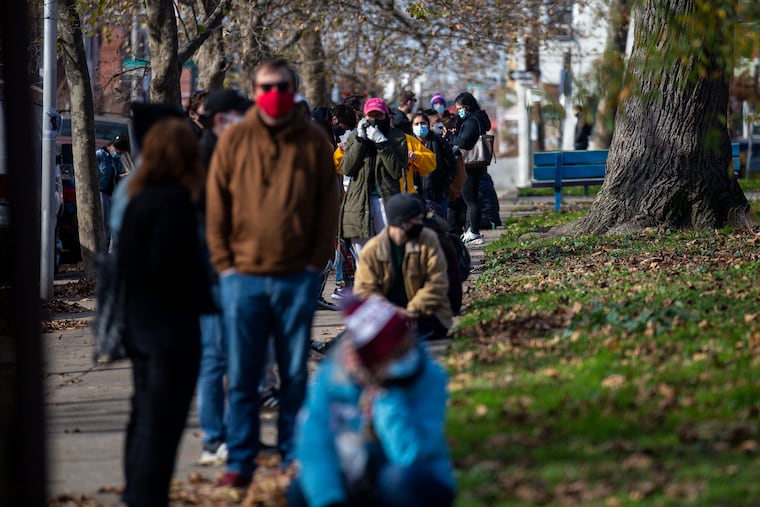Philadelphians getting tested for COVID-19 before Thanksgiving encounter long lines, shortage of appointments
Around 5,000 to 6,000 COVID-19 tests are being conducted per day, according to Philadelphia’s Department of Public Health.

Pele IrgangLaden knew that after attending the protests and celebrations that followed Election Day, getting tested for COVID-19 was the responsible thing to do. So two weeks ago, IrgangLaden, a 28-year-old activist based in West Philadelphia, scheduled an appointment at Sayre Health Center, a clinic offering free testing for those without symptoms at 59th and Locust Streets.
But when IrgangLaden and his partner arrived at Sayre at 9:30 a.m., just half an hour after the center opened, the car line was already three blocks long. The couple waited about five and a half hours for nasal swabs.
“The wait was the wait,” said IrgangLaden, who had waited only half an hour for his two previous tests at Sayre. “Sayre is probably the best-known place to get a test. It’s very well known in the community.”
That demand has only increased in recent weeks as Philadelphians try to get tested before Thanksgiving, with many residents struggling to find an available testing site, or scheduling appointments on the phone and then waiting hours once they arrive at the site. The problem is especially prevalent at places that offer free or asymptomatic testing. Appointments at Rite Aid and CVS Pharmacy, both of which have been offering free COVID-19 tests since the spring, are now often unavailable.
PJ Brennan, chief medical officer of the University of Pennsylvania Health System, said Penn-affiliated testing sites have seen demand increase in the past four weeks. Since Nov. 9, 1,073 tests have been administered at its community testing site at 4040 Market St. for symptomatic patients, Brennan said, and 3,132 tests have been administered at Sayre, which has a partnership with Penn.
“Last month, on average, we were testing around 550 people per week at Sayre and 450 per week at the West Philadelphia site,” Brennan said by email. “We suspect that the news about the increase in cases is likely causing people to worry more about COVID and driving them to testing.”
Among all the sites in Philadelphia, around 5,000 to 6,000 COVID-19 tests are being conducted per day, according to the city’s Department of Public Health. The number of people getting tested per week has climbed steadily since mid-September, and the number of positive COVID-19 cases peaked in Philadelphia at 1,075 on Nov. 11, the highest since March.
“We saw a spike in testing last week,” Jim Garrow, communications director of the Department of Public Health, said in an email.
Other big cities like New York City reported reaching record numbers of tests this week. Garrow said the city “wondered why we’re not seeing that. Just hearing anecdotally, we think we might be at our testing capacity.”
Garrow said that the department believes that the increase in testing is being driven by two factors — more community spread of COVID-19, leading to more exposure, plus pretesting for holiday travel. Health Commissioner Thomas Farley said at a briefing Thursday that the city was looking to help manage demand at some of the smaller community testing clinics.
“The Health Department continues to discourage holiday travel as we are in what could be the worst wave of the pandemic and spending time around people not in your normal household is a recipe for further spread,” Garrow said. “It’s important to remember that a negative case today does not necessarily mean that you’re negative; you could test positive tomorrow.”
Getting tested in a timely fashion has become more difficult outside of Philadelphia as well. Michael Leone, a South Jersey resident, knew that getting tested for COVID-19 had become more challenging in the last few weeks. To avoid a long wait, Leone, 51, showed up to the free testing site at Rowan University at 7:15 a.m. on Tuesday, nearly two hours before it opened. He was the 20th person in line.
By 7:45 a.m., Leone, who was getting tested because he had been exposed to someone who tested positive, said the line wrapped all the way around the building.
“It was at least a two-hour wait for those people,” said Leone.
In the Philadelphia region, free testing sites are in high demand. Krista Xavier, a 29-year-old artist living in Broomall, struggled to find a “clear-cut option” when she developed a cough recently. Many of the pharmacies she checked were booked for the week. Eventually she went to Main Line Health in Springfield for a test and a chest X-ray.
“That facility of Main Line Health didn’t accept Medicaid, which I have because I’m unemployed,” Xavier said. “So my mom ended up paying $150 for my test.”
Navigating free testing sites can be confusing, as each has its own requirements and many are open for a few hours at a time and closed on weekends. Tess Galen began looking for a site where she could get regularly tested after her workplace reopened to the public in September.
“I wanted to know exactly where I could go if I needed a test before I could get an appointment with my doctor,” said Galen, 29, of North Philadelphia. “Here we are at the end of November and I still don’t really know where I would go. It seems most everywhere … you have to have a doctor’s note or be showing symptoms, which sort of defeats the purpose when most people are asymptomatic.”